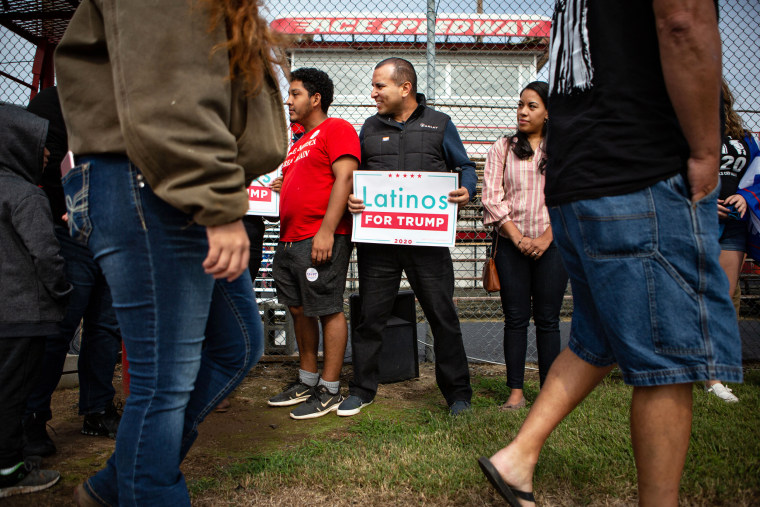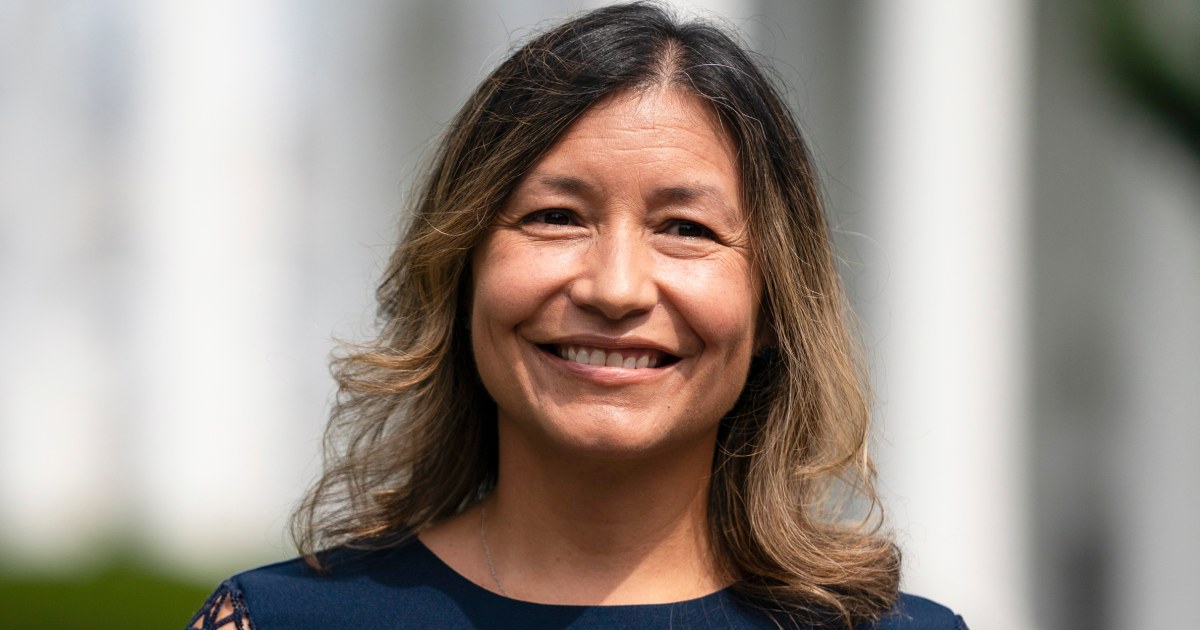Yet Biden is surrounded by advisers he has known for decades and trusts implicitly. In a few cases, they’re family. In others, they’re family in all but name. Some helped guide Biden’s political ascent before Chávez Rodríguez, 45, was even born. Others stuck with him through illness, personal tragedy and two losing presidential bids. They’ll see and talk to him in the Oval Office as Chávez Rodríguez deploys staff and pores over budgets at campaign headquarters 120 miles up the road.
All those dynamics have given rise to misgivings that Chávez Rodríguez will be merely a figurehead, carrying out the priorities and enforcing the directives of the core loyalists, notably White House advisers Anita Dunn, Steve Ricchetti and Mike Donilon; former White House chief of staff Ron Klain, and the person who ran Biden’s only successful presidential campaign thus far, White House Deputy Chief of Staff Jen O’Malley Dillon. (Dillon was his second campaign manager after the first was replaced as Biden pivoted from the primaries to the general election campaign against Donald Trump).
“No one in Democratic politics thinks she’s in charge. And that’s the problem,” said a Democratic strategist, speaking on condition of anonymity to talk freely about the campaign. The strategist added that a state party official recently confided, “‘Why the hell would I call her [Chávez Rodríguez]. I’m going to call Anita.’”
Another Democratic strategist, also speaking anonymously to offer frank assessments, said that while Chávez Rodríguez is smart and capable, the new role amounts to a “massive test.”
“Campaigns ebb and flow,” this strategist said. “When they dip, they will have to make a change. That often means deep-sixing the campaign manager.”
‘She comes from the community’
Chávez Rodríguez was among the White House and party officials who spoke to a group of Biden fundraisers at an event last weekend at a Washington, D.C., hotel. One guest said that her speech was mostly an introduction that laid out her experience and background for those in the audience who didn’t know who she was.
“None of us have interacted with her or know her,” this person said, speaking on condition of anonymity to discuss a private event.
Presidential races are littered with examples of candidates ousting campaign managers or “layering” them with people abruptly brought in to fix perceived weaknesses. Staff are expendable; the candidate is not. Chávez Rodríguez is the second Latina to head a major presidential campaign. The first, Patti Solis Doyle, ran Hillary Clinton’s campaign in 2008 and was replaced after rival Barack Obama reeled off a string of victories in the Democratic primaries en route to victory.
Friends and allies of Chávez Rodríguez don’t want her to meet a similar fate should the campaign falter. Those close to Biden insist that won’t happen. They said that she has won Biden’s trust and is respected by the same top tier of advisers who have the president’s ear.
One speaker at last weekend’s event described her to the audience as the choice of not only the president but of Jill Biden, a peerless East Wing ally.
After he was named White House chief of staff, Klain said the second person he hired was Chávez Rodríguez, having been impressed by her work and “no drama” persona during the 2020 campaign. (The first hire was O’Malley Dillon, he said).
Chávez Rodríguez has “built a working relationship with every one of the senior people around the president who’ve worked with her every day these past two years,” Klain said in an interview. Noting that she took part in the daily 7:20 a.m. senior staff meeting, he said that “she knows the other people who work closely with the president. She has good personal relationships with them. She has played a key role in helping us achieve the president’s successes and understands how they’re baked into the campaign and what they’re about.”
Inside the White House, Chávez Rodríguez has been a low-profile figure who remains studiously discreet. A few days before her appointment became public, her father, Arturo Rodríguez, was in town visiting. At no point did his daughter tell him that she might be picked as Biden’s campaign manager.
“She never let us know anything about this,” said Arturo Rodríguez, former president of the United Farm Workers union and son-in-law of Cesar Chávez. “We were having a great time talking and sharing but she was always pulling away and getting on the phone.”
The White House did not make Chávez Rodríguez available for comment. She is scheduled to start her new job the week of May 15. A White House press spokesman, Andrew Bates, said: “The president and the campaign staff will run the campaign, while the White House staff will have the typical, limited engagement that the law provides for, consistent with past administrations.”
Few can argue that Chávez Rodríguez fills an immediate and obvious hole. Biden’s inner circle is a monochromatic operation — white and largely over 60. Installing Chávez Rodríguez as campaign manager is, at the most basic level, a symbolic gesture to a fast-growing Latino population that Democrats need to mobilize, Biden allies said. They have work to do on this front.
The number of Latinos eligible to vote in 2024 is likely to reach 37 million — 4 million more than in 2020, said Mark Hugo Lopez, director of race and ethnicity research at the Pew Research Center. That number translates to 15% of all eligible voters, up nearly 3 points compared with four years ago.
Trump made substantial inroads with Latino voters in his losing presidential bid. He won 38% of the Latino vote in 2020 — 10 points higher than he fared in the 2016 election, Lopez said.

Perhaps more worrisome for Democrats is that a good chunk of Latino voters don’t believe the party cares all that much about them. A Pew survey last year found that 34% did not believe that the statement that the Democratic Party “really cares about Latinos” aptly describes their views.
One of Chávez Rodríguez’s jobs will be to reach the swath of young Latinos voting for the first time, getting them registered and persuading them that Biden is the best choice.
“The good news about Julie, for us in the Latino space and activist space, is that she comes from our community,” said Chuck Rocha, a political consultant and Democratic Party strategist in Texas. “That doesn’t mean Julie is a savior. But we would much rather have one of our own calling the shots in the overall campaign than somebody who’s not from our community who can’t relate.
“What this does, with Julie, is break down the barriers to make it easier now to hire that Latina or Latino, Black woman or Black man, somebody other than a white woman or man,” said Rocha, “who normally runs these races.”
‘She won’t get rolled’
Chávez Rodríguez comes to the role steeped in the overlapping worlds of organized labor, Democratic politics and Latino policy.
Growing up in a family of activists, she was on picket lines as a child and was arrested at age 9 for taking part in a protest.
She was close to her grandfather, whom she called “Tata,” a common Spanish term of endearment for a grandfather. In 1988, Cesar Chávez embarked on a five-week fast to protest the use of pesticides on table grapes. Chávez Rodríguez, then 10 years old, went to a supermarket in Fresno, California, with other volunteers to pass out leaflets about the protest. One woman said to her, “‘I hope he dies this time,’” her father recalled.
Coming home upset, she talked to her grandfather about what had happened. “The next time someone says that, say you’re in our prayers and leave it that,” Chávez told her, Arturo Rodríguez said.
She graduated from the University of California, Berkeley, and after a stint at the foundation named after her grandfather went to work for the Obama administration. At the White House’s Office of Public Engagement, she was at times a sounding board for aggrieved constituencies looking to vent. She told NBC News in 2015 that the work allowed her “to see the commonalities among these groups, and to understand the uniqueness of these coalitions as well.”
Janet Murguia, president of UnidosUS, a Latino advocacy group, recalls talking to her about the high volume of deportations carried out by the Obama administration, prompting immigration advocates to label Obama “deporter in chief.”
“She is certainly someone who can understand there was a lot of pain and suffering going on in our community during the height of the deportations that occurred during the Obama administration and was trying hard to reconcile the different points of view there,” Murguia said.
But she’s no pushover. Advocates say she stands up for the boss. Earlier this year, Mary Kay Henry, president of the Service Employees International Union, spoke to Chávez Rodríguez at a reception and raised concerns about the president’s new policy restricting migrants’ ability to claim asylum in the U.S.
“I came on strong and said, ‘Listen, it’s not right what the president is doing on this policy,’” Henry recalled. “And she put her hand up and said, ‘Hold on, Mary Kay. Take a breath here and let me make my case for why I think what we’re doing is as measured as can possibly be at this moment.’ ”
“She won’t get rolled,” Henry said.
A presidential campaign is a place where people can get rolled and often do. When poll numbers slump or fundraising lags, the candidate faces pressure to assign blame and shake up the staff. Biden’s longtime confidants are untouchable; they’re forever part of his world. Chávez Rodríguez is a different case. But she has one enduring advantage: the “sisterhood” of Democratic strategists and operatives who have strong ties to the White House and are determined for her to succeed.
“It would send a terrible message if the second Latina ever to serve as campaign manager didn’t have the full authority at this moment,” one Democratic strategist said, speaking on condition of anonymity to talk more freelly. “The assumption has to be that she has the full faith and confidence of the president.”
Solis Doyle, the former Clinton campaign manager, offered a bit of advice:
“Julie’s career and experience with the candidate and the people around the candidate will help her immensely,” she said. “But she has to keep her head in the game and not get distracted by the last person who was in the room with the president or the vice president.”

